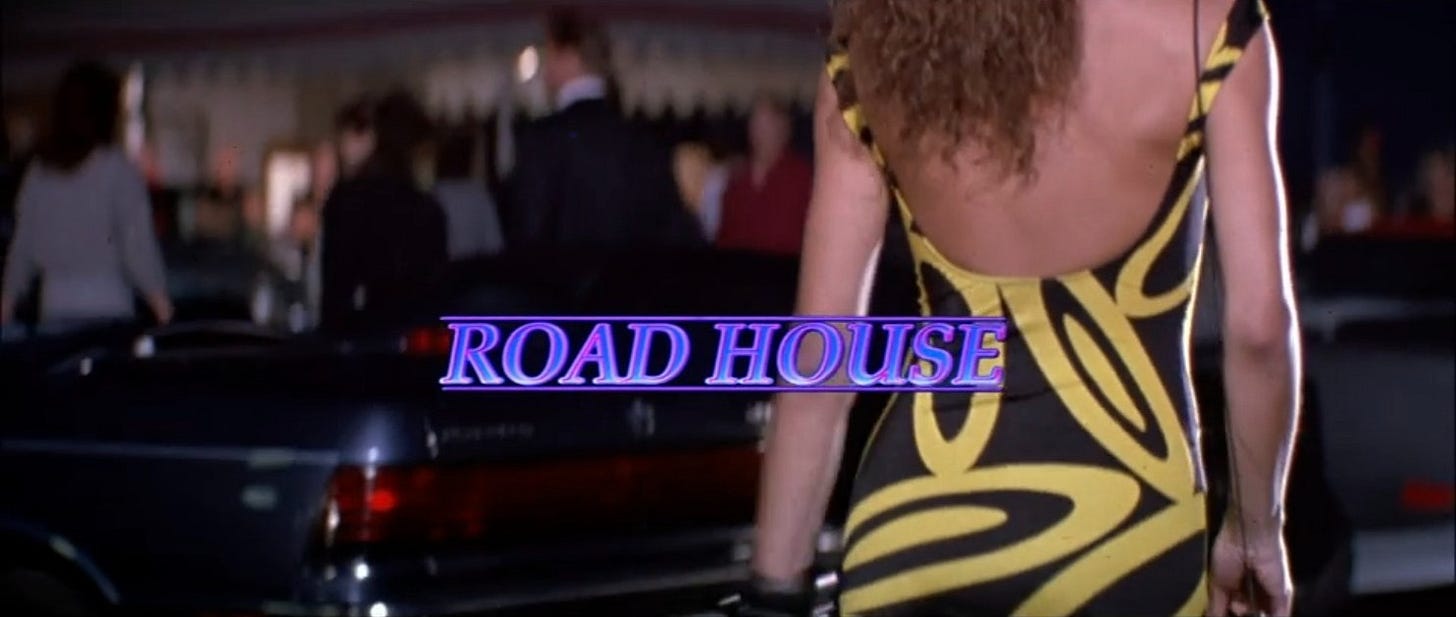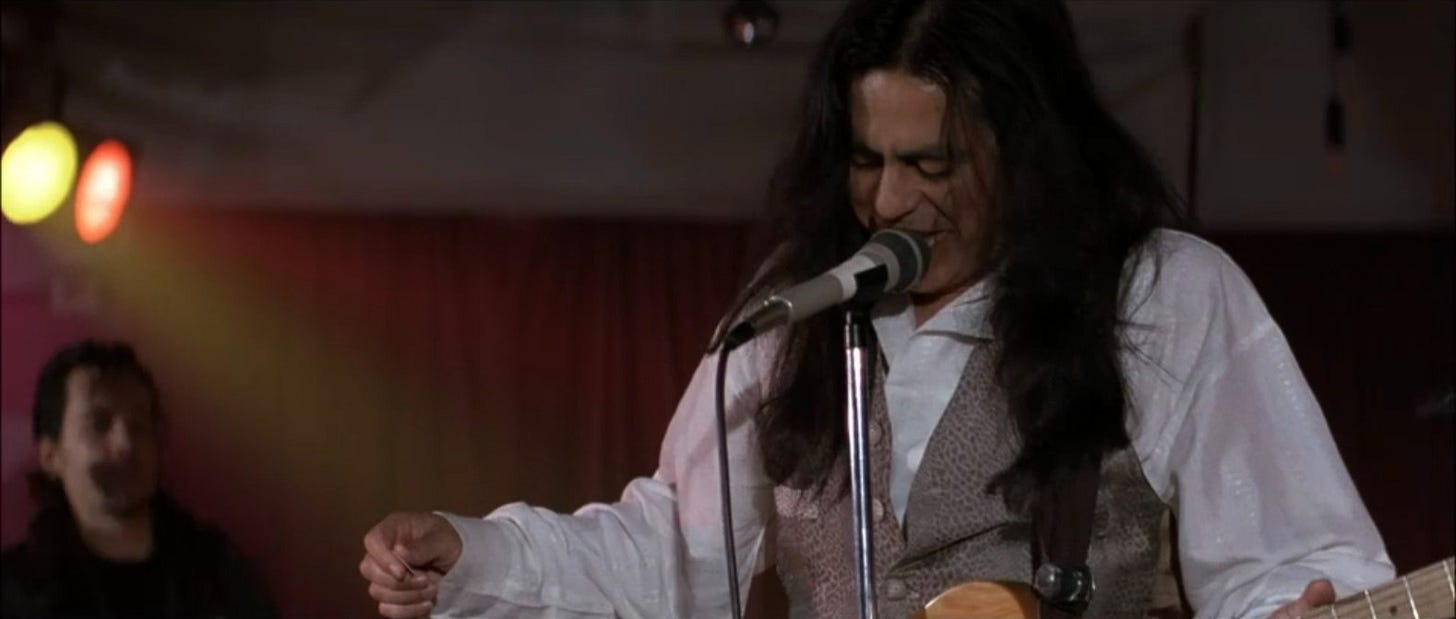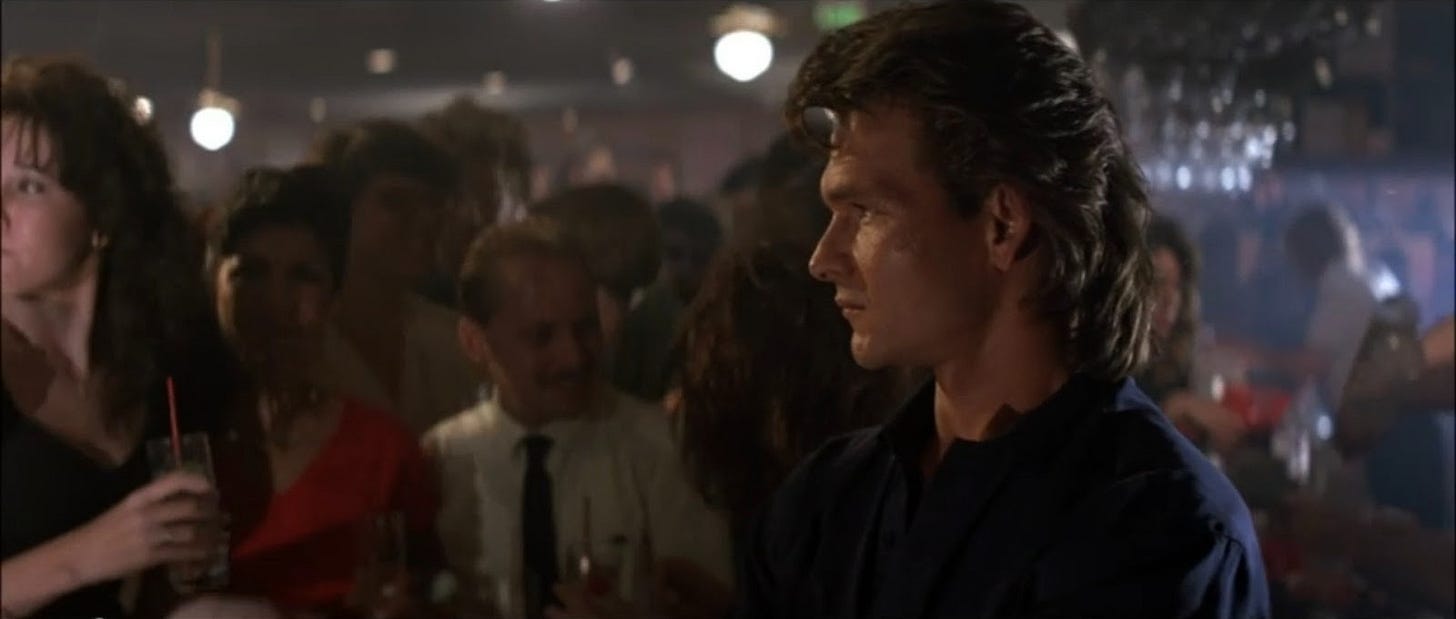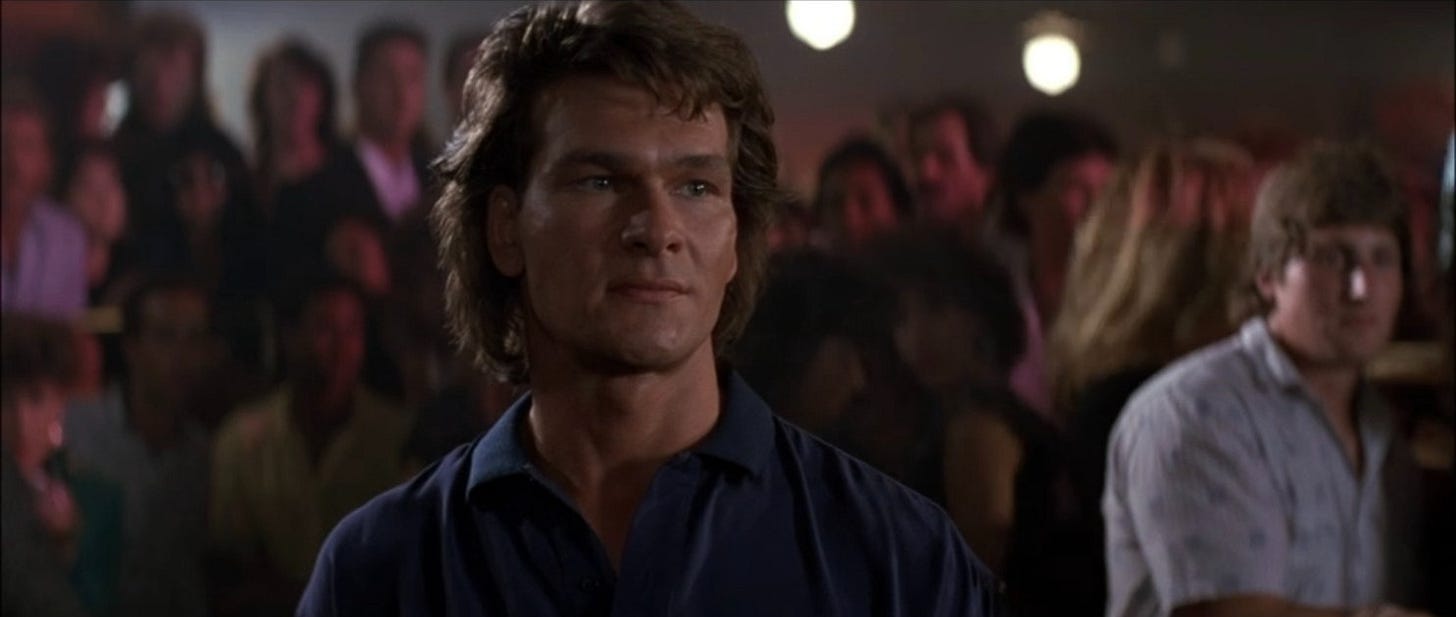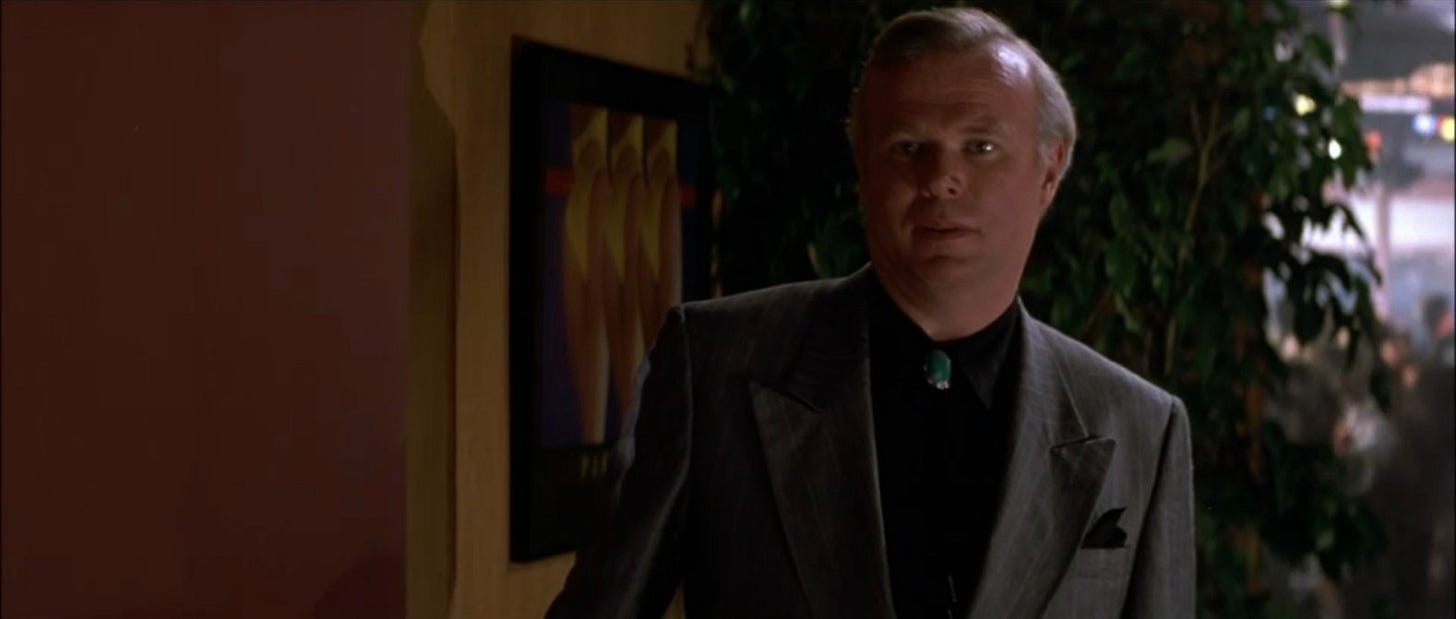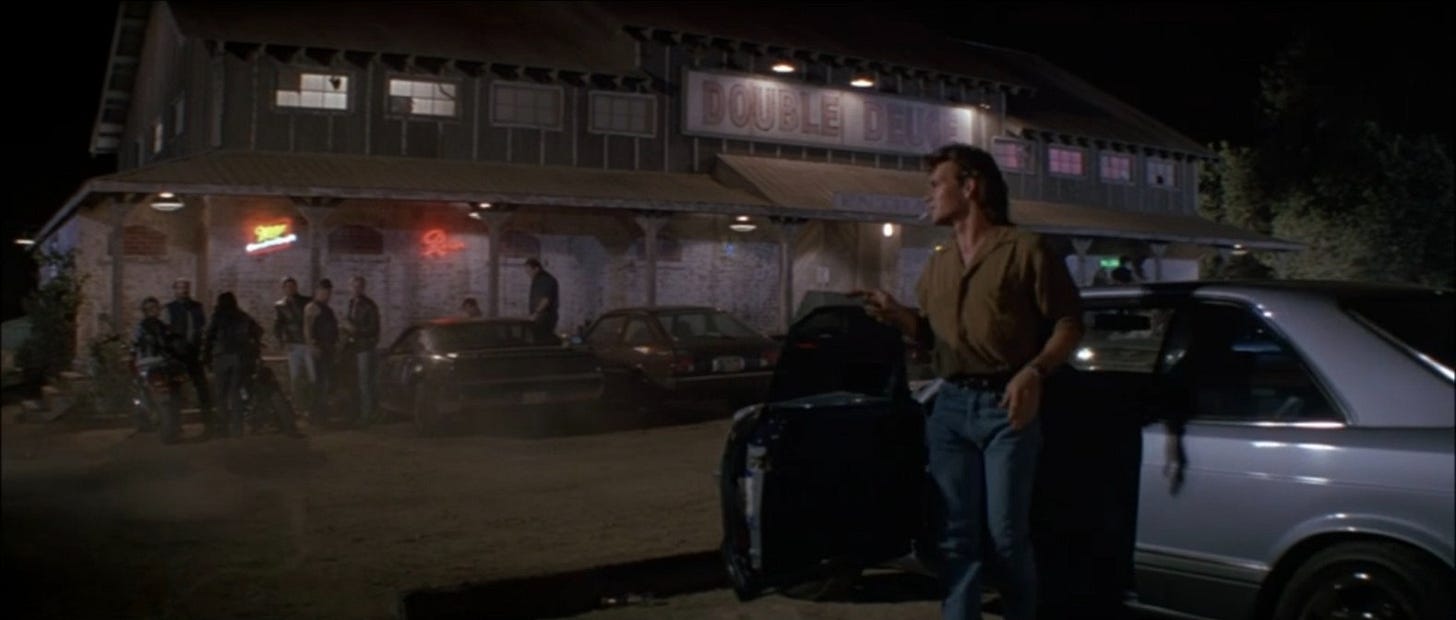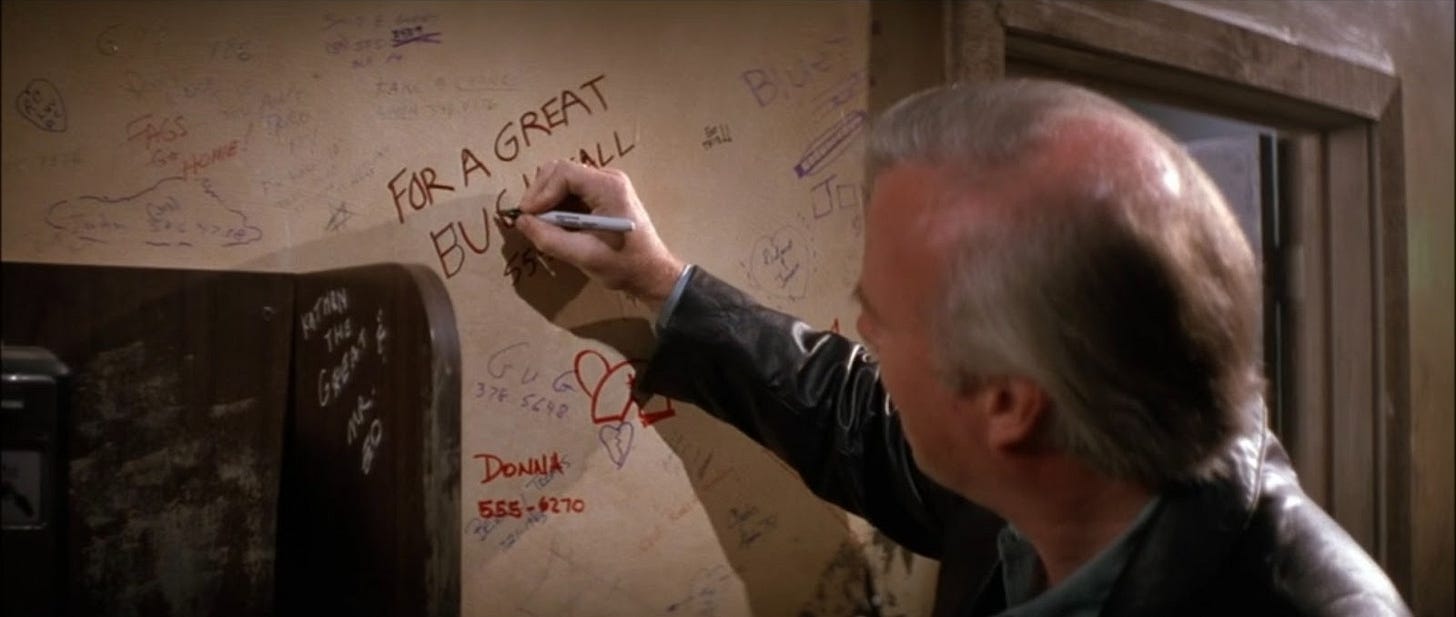Road House
A big dose of earnestness elevates what should’ve been a standard action movie into a cult classic
Directed By: Rowdy Herrington
Other Notable Films From Herrington: Just Road House. Maaaaaybe Gladiator (the Cuba Gooding Jr. one, not the Russell Crowe one).
Starring: Patrick Swayze, Patrick Swayze’s hair, Kelly Lynch, Ben Gazzara, Sam Elliott’s molten charisma
Screenplay By: David Lee Henry and Hilary Henkin
Movie Synopsis: A renowned bouncer gets hired to clean up a rough-and-tumble bar in Jasper, Missouri. It leads to unintended (and unexpected) consequences.
Signature Line: “Pain don’t hurt.”
THE INTRODUCTION
An accounting of time, and people, and context
About halfway into Road House, a conversation takes place between Dalton (a nomadic bouncer-for-hire played by Patrick Swayze) and Dr. Elizabeth Clay (his romantic interest, played by Kelly Lynch).
As the two sit in a diner, drinking coffee and smoking cigarettes, Clay, who earlier in the evening watched Dalton beat up a group of potential troublemakers, asks, “Are you always better than they are?” “Pretty much,” he replies. “Never been put down?” she asks. “No, not really,” he says. “How do you explain that?” she wonders.
Were this another action movie—one led by, say, Arnold Schwarzenegger, or Steven Seagal, or even Jason Statham—Dalton would have responded with some quip about how he’s the best, or how he’s the toughest, or how he’s the most highly trained. But Road House isn’t a Schwarzenegger action movie or a Seagal action movie or a Statham action movie. It’s a Swayze action movie. So instead, Dalton glances down at the table as he rolls his thoughts around in his head, finds an answer he believes to be meaningful enough to say out loud, looks up at Clay, then responds, “The ones who go looking for trouble are not much of a problem to someone who’s ready for them. I suspect it’s always been that way.”
It’s a remarkable bit of wisdom, made all the more astonishing by the context it arrives in, which is to say, in a movie where a bad guy drives a monster truck as his daily vehicle.
But that's the appeal of Dalton as a character. He is, by design, a philosophical creation, and that makes him a curio in the action movie canon. Yes, he punches and he kicks and, should the need arise, he is capable of ripping a bad guy’s throat out with his bare hands.
But that's not what makes Dalton exceptional. What makes him exceptional—and, in turn, what makes Road House exceptional—is that Dalton weighs the morality of those actions in real time. He believes that physical confrontation will, either now or eventually, dampen the delicate tissue paper of his humanity. It informs every decision he makes, and it’s why so many of the small questions that get asked of him draw out such profound responses.1
I like Road House. I enjoy it as a movie, genuinely and unironically. It has ridiculous sequences, yes, and ridiculous characters, yes, and even a handful of ridiculous notions, yes. But they’re always in service of a grander idea.
And so I suppose the natural question to arrive at, then, is: Is Road House a good movie that is good, or is it a bad movie that is good?
And the answer to that, in a Dalton-like fashion, is: Does it really matter?
THE VIEWING
A timestamped rewatch of Road House
1:10: Try as I might, I cannot recall the first time I sat down to watch Road House. I know I was old enough to remember seeing movies back then, because Batman came out that same year, and I absolutely remember the first time I watched that. But there’s no core first-watch memory for Road House. It’s just sort of always been there, is how it feels; like air, or gravity, or Gregg Popovich.
1:11: By the way, 1989 was a great year for movies. In addition to Road House, we got: Batman, Indiana Jones and the Last Crusade, Lethal Weapon 2, Look Who’s Talking, Gleaming the Cube, Bill & Ted’s Excellent Adventure, Lean on Me, Heathers, Cyborg, Major League, Say Anything…, Kickboxer, Field of Dreams, Pet Sematary, Dead Poets Society, No Holds Barred, The Karate Kid Part III, Weekend at Bernies, When Harry Met Sally…, Friday the 13th Part VIII: Jason Takes Manhattan, Parenthood, Lock Up, Little Monsters, Puppet Master, Best of the Best, Harlem Nights, Back to the Future Part II, National Lampoon’s Christmas Vacation, Glory, The Wizard, Born on the Fourth of July, and Tango & Cash. That's a crazy roster.
1:34: The band performing right now is a real-life band called Cruzados. Their lead singer, Tito Larriva, popped up in a bunch of stuff in the ‘90s and early 2000s, including but not limited to Desperado, From Dusk till Dawn, and Once Upon a Time in Mexico. (Two of those movies are really great, and the other one is Once Upon a Time in Mexico.)
2:05: We just got the first gratuitous shot of a woman’s breasts. (The credits are still rolling, by the way.)
2:34: Patrick Swayze’s here. He plays Dalton, a very-in-demand bouncer who specializes in cleaning up unsavory night clubs and bars. To expand a little on the point I made in the introduction: Swayze’s the only person on the planet who could’ve pulled this role off. He had the exact right mix of physicality, charisma, intellectualism, and general coolness. He turned what would’ve otherwise been a completely ridiculous character into something everlasting. Schwarzenegger couldn’t have done it. Stallone couldn’t have done it. Van Damme couldn’t have done it. Willis couldn’t have done it. Only Swayze.
2:35: How about this stretch from Swayze: The Outsiders in 1983, Red Dawn in 1984, Dirty Dancing in 1987, Road House in 1989, Ghost in 1990, and Point Break in 1991. Fucking heat.
2:48: Bang. Our first bar fight. What do you think happens more times in Road House, the director (Rowdy Herrington) shoehorning in a shot of some boobs or a bar fight breaking out? Make a guess. I’m gonna keep a tally as we go through the movie. It’s a tie game right now. 1-1.
3:03: Look at this haircut. It looks like a lion’s mane. I love it. If heaven is really the way it’s shown in This Is The End where you get to have whatever you want, the first thing I’m gonna ask for is this haircut.
4:02: Oh shit. I forgot Michael Kamen worked on this movie. (The credits are still rolling. His name just flashed on the screen.) Kamen’s filmography is incredible. He did the score for the first three Die Hard movies, all four Lethal Weapon movies, Adventures in Babysitting (I loved this as a kid), Nothing but Trouble (extremely underrated), Event Horizon (one of my favorite horror movies), plus The Iron Giant, the first X-Men movie, and a bunch more.
4:15: Dalton is giving himself some stitches after a drunk bar patron sliced him across the shoulder with a knife during an altercation. A lot of people might need a doctor for stitches, but that's only because a lot of people aren’t Dalton.
5:54: Kevin Tighe’s here. He plays Frank Tilghman, the owner of a seedy bar in Jasper, Missouri. He wants Dalton to come clean it up for him. Dalton says he’ll do it, but only if Tilghman agrees to (a) pay his rate of $5,000 upfront + $500 per night + all medical expenses covered; and also (b) allow Dalton complete control of how things are run. Tilghman gives the thumbs up on the demands, then reaches into his pocket and pulls out a pre-purchased plane ticket for Dalton. Dalton looks at Tilghman, smolders for a beat, then, while still in the middle of giving himself his own stitches, says, “I don’t fly. Too dangerous.” What a man. If I had a uterus, there’d be a baby in there right now.
8:23: Dalton’s made his way to the bar he’s supposed to clean up (the Double Deuce, as it were). When he walks in, he sees:
A cage around the stage to protect the band from the bar patrons.
A guy dancing shirtless.
A guy high on some sort of drugs near the entrance.
A guy manhandling a woman (presumably his wife or girlfriend).
A fight breaking out near some pool tables (Bar Fights are beating out Gratuitous Boobs now, 2-1).
An inattentive bouncer ignoring the fight to hit on a woman who looks too young to be in the bar.
A customer trying to physically force a waitress to sit on his lap.
A different waitress dealing drugs.
And a different customer getting punched in the stomach, thrown across the room, then kicked out of the bar by a different bouncer for sexually harassing a different woman.
11:20: A waitress (Carrie Ann, played by Kathleen Wilhoite) chats up Dalton. When he tells her his name, she gets very giddy and responds, “Oh my God. Shiiit. I heard of you.” Every movie asks its audience to buy into at least one unbelievable thing. Back to the Future, for example, asks its audience to believe that time travel is real. Jurassic Park asks its audience to believe that dinosaurs have been unextincted. Inception asks its audience to believe you can steal thoughts from someone’s brain via their dreams.
Road House asks its audience to believe that there's a class of world famous bouncers, which is somehow the most preposterous of all those examples.
11:42: There's a part here where Tilghman changes some graffiti from “FOR A GREAT FUCK CALL 555-7617” to “FOR A GREAT BUICK CALL 555-7617.” Some of the other graffiti on the wall:
Keep reading with a 7-day free trial
Subscribe to GOOD MOVIE to keep reading this post and get 7 days of free access to the full post archives.






